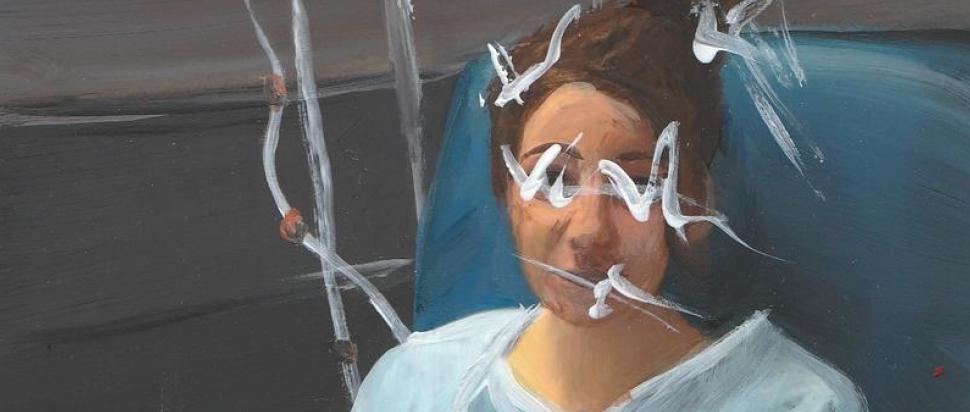Mind & Body Politic: In conversation with Ally Zlatar
With Eating Disorder Awareness Week at the end of February, we speak to the founder of The Starving Artist about reshaping narratives, creating change, and centring individual experiences
Having developed an eating disorder at 13 that lasted into her twenties, Canadian Ally Zlatar had found herself unable to have open and honest conversations with her friends, family, or medical practitioners about her experience of the illness, often feeling confined by external perceptions of the diagnosis. Looking back, she says, “I always felt my voice wasn't being heard when I was suffering [...] there was this lack of authentic engagement in what it was like to endure a mental illness, like an eating disorder or body dysmorphia.” Wanting to air these feelings through her artistic practice, she put out a callout in 2017 hoping to find a handful of artists with similar experiences. To her surprise, she was contacted by over 50 artists and three universities, and the inaugural The Starving Artist exhibition and publication attracted global attention.
The central tenet of this first The Starving Artist exhibition was to recenter the subjective experiences of those with eating disorders, rather than the external perceptions and assumptions about those who suffer from these conditions. The work grapples with often heavy and under-discussed aspects of eating disorders and body dysmorphia, such as sexualisation, control and abjection. Discussing the importance of art as a medium to address these topics, Zlatar says that “[art] really helps break down barriers and give us a new way of understanding eating disorders," specifying the widely held misconception “that there's one prescribed way of trying to heal [...] I didn't think that worked for me, and it doesn't work for many people which is why eating disorders are often a lifelong illness.”
Over five years on from that first exhibition, The Starving Artist has continued to expand, with collaborating publications, global exhibitions such as an upcoming exhibition in Taipei looking at menstruation and the body, and countless speaking engagements such as Zlatar’s TEDx talk on art and activism. While she is grateful for the recognition her work has received so far, she is dedicated to continuing to broaden the project’s reach: “People don't have a platform to talk about food and body image in a way that's authentic and vulnerable, especially within modern conversations of body positivity. There’s this focus on loving and embracing every aspect of yourself, but what happens when you don't?” she asks. “So often these illnesses are behind closed doors and it's very, very rare that we find a space and platform where we can actually talk about it.”
Throughout our entire discussion, Zlatar returns to the political underpinning of her work. In mainstream media, there’s a truly limited representation of the actual experience of enduring an eating disorder. “They come in all sorts of shapes and sizes and bodies, and public discourse always lacks this intersectionality,” she says. "It fails to consider how other mental health issues play into an eating disorder, how disability, race or socio-economic status also play a role in that experience. Art, I think, just strips that away and really allows us to look at these conditions through an alternative modality.”
The project’s latest activist focus is the outreach campaign This Body of Mine, which specifically explores the journeys and experiences with body image of migrant and displaced persons; as someone from a family of displaced persons from former Yugoslavia, Zlatar, now based in Scotland, emphasises the importance of interrogating these under-explored intersections. Bringing the discussions invoked by the project’s work out into the wider sphere is crucial: “Whilst it’s nice to have conversations in a gallery, how do we actually bring it out to the public?”
Alongside its artistic and visual research projects, The Starving Artist has run many youth and school workshops, encouraging young people to explore art as a way for them to process their experiences with mental health, and Zlatar hopes that the project can use art as a way to bridge into education, policy and healthcare reform. She particularly stresses the need for more patient-centric models of treatment, so that eating disorder patients can have their voices heard and use their lived experiences to collaborate on finding what resources and tools work for them.
Through sharing her own personal journey within the mental healthcare system, even speaking at the Scottish Parliament, she hopes to advocate for systemic change. “Traditional treatment didn't help me at the time when I needed it. So, I found my voice through art, and that has really helped me and my recovery process,” says Zlatar. “But now, I want to use art as a way for me to be able to help broaden these conversations, on how we can try to make these systems better for everybody.”
Find out more about The Starving Artist at starvingartist.cargo.site
